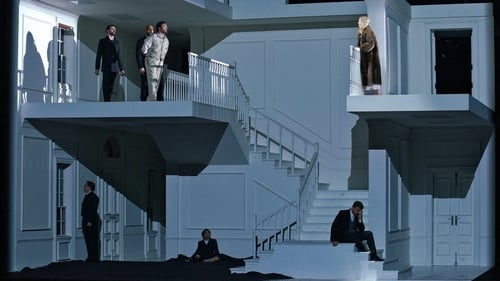
This hilarious contemporary version of Francesco Cavalli's baroque opera Hercules in Love was commissioned on occasion of the marriage of Louis XIV, the Sun King, to Maria Theresa of Spain. The original production took two years to complete and was at the time the greatest show ever performed in Europe. Directed by David Alden, this surreal production is a triumph of commedia buffa resplendent with decorative and symbolic elements, and complemented by Constance Hoffman's exceptional costumes. Led by Ivor Bolton, a master of baroque music, the chorus of De Nederlandse Opera and Concerto Köln give a sublime performance. With Luca Pisaroni's (Ercole) singing being heroic and melodious in turn, and Veronica Cangemi as a splendid Iole, this is an outstanding production by the DNO. Filmed in High Definition and surround sound.

Lucio Silla
Having disposed of his enemies, Lucio Silla is now all-powerful. He wants to marry Giunia, but underestimates how much she hates him. After all, he has not only had her father murdered, but has also banished her beloved, Cecilio. At first, Giunia is misled into thinking that Cecilio is dead; with the help of Cinna, however, the lovers manage to meet up again. The power of love and Cinna’s machinations finally persuade Silla to relinquish his power.

Grimoaldo
Claus Guth's exciting 2017 staging of Handel’s "Rodelinda" at Madrid’s Teatro Real, featuring Lucy Crowe and Bejun Mehta as Rodelinda and Bertarido, with conductor Ivor Bolton. After the successes of "Giulio Cesare" in 1723 and "Tamerlano" in 1724, Rodelinda completes the trilogy of Handel’s great opera seria masterpieces. The work was composed in 1725 using Nicola Francesco Haym’s libretto, a work inspired by Antonio Salvi’s earlier libretto which had been itself adapted from Pierre Corneille’s tragedy "Pertharite, roi des Lombards". Rodelinda thus brought one of the most glorious compositional periods in the Handel’s career to a close, about a decade after his arrival in the British capital. Mixing romantic storytelling and political intrigue, Handel produced one of his most beautiful scores, a true operatic tour de force.

In Tamerlano, Handel defied rules both written and tacit—offering a main role to a mature tenor at a time when the castrato voice dominated; and not shying away from shocking scenes that other composers approached hesitantly, like suicide. Pierre Audi’s elegant, minimalist staging allows an all-star cast of singers to highlight the work’s many dramatic elements, proving that Baroque opera can still move and thrill us as it did 300 years ago!



